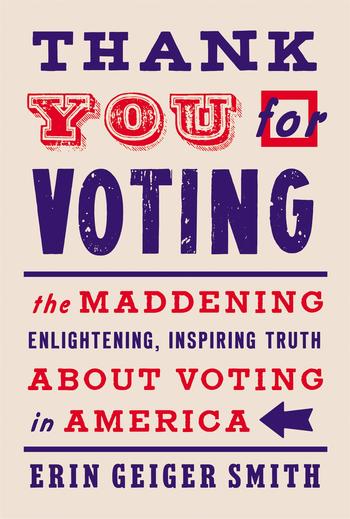Voting is a cherished American right, but more than 40 percent of eligible adults don’t do it. In her new book, Thank You for Voting, lawyer and journalist Erin Geiger Smith ’09JRN writes about how we got here and what the future might hold.
How did you become interested in voting rights?
I studied voting rights in law school and have reported on voting as a journalist. But after the 2016 presidential election, I was struck not only by how polarized our country was but by how many people weren’t participating at all. And every age group is voting less than the one before it. I grew up in a small town in Texas and now live in New York City, which are at opposite ends of the political spectrum. But in both places, I could see that people yearned for representation. I wanted to know why so few people were showing up at the polls.
Why do you think so many Americans choose not to vote?
I don’t think it’s apathy. I think that if you ask most people about the issues that concern them, they cite things like the economy and health care and education, all of which are inherently political. But we as a society don’t teach the mechanics of the voting process. It’s a complicated, often intimidating system that varies widely from state to state. If it’s never been a part of your life, it’s hard to make it a habit.
What about voter suppression?
It’s certainly an issue. There are a number of laws that make it more difficult for segments of the population to vote, most of which have a disproportionate impact on minority voters. After a 2013 Supreme Court decision struck down parts of the Voting Rights Act, several states were emboldened to add voting restrictions. These included requiring voter ID, limiting early-voting periods, and ending same-day registration. In recent years, states have become aggressive about “purging” their voter rolls, or eliminating voters who didn’t vote in the previous few elections. We’ve also seen states drastically reduce the number of polling sites.
The world has changed significantly since you submitted your manuscript. How do you think the COVID-19 pandemic will affect voter turnout in the 2020 election?
Anyone who says they know exactly what’s going to happen is lying. Obviously, more people are going to vote by mail than ever before. In general, states that have universal vote-by-mail have a higher turnout. But that doesn’t necessarily mean that the trend will extend to all states that encourage mail-in voting in this election. States are having to implement new systems, deal with a whole lot more paper, and educate voters without sufficient support from the federal government. We don’t know how it will shake out.
Many politicians, including President Trump, have expressed concern about voter fraud, particularly if vote-by-mail becomes more common. Is that a legitimate concern?
No. Voter fraud is extremely rare in all cases, including vote-by-mail. States have safeguards, such as printing ballots on specifically weighted paper and including unique barcodes, so it would be almost impossible to orchestrate fraud on a large scale. Voter fraud is also a felony, punishable by jail time or deportation for illegal immigrants. So the risk is very high for a very small payoff.
Is there any indication that vote-by-mail favors one party?
I think it’s difficult to say in a nationwide election. Several of the states that already have universal vote-by-mail lean Democratic, which I think has led to some of the panic on the Republican side. But that’s not absolute: Utah is a reliably red state that uses universal vote-by-mail. There’s no evidence right now that the process favors one party or another.
What would you say to someone in a non-swing state who thinks her vote doesn’t matter?
First of all, I would tell her to remember that the presidential race is not the only thing on the ballot. If we’ve learned nothing else from the pandemic, it’s that the lion’s share of governing in America takes place at the state and local levels. I would remind people that states can shift politically; there are states in play in this election that were not in play in 2016. And finally, even if the outcome in a state is a total certainty, I think that it does matter how many people in the losing party vote. It tells the winning candidate where that state stands. If you don’t vote for your candidate of choice, it takes away a bargaining chip.
This article appears in the Fall 2020 print edition of Columbia Magazine with the title "Raise Your Voice."




